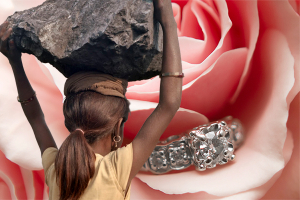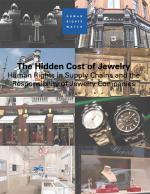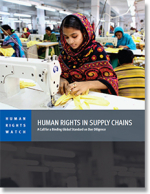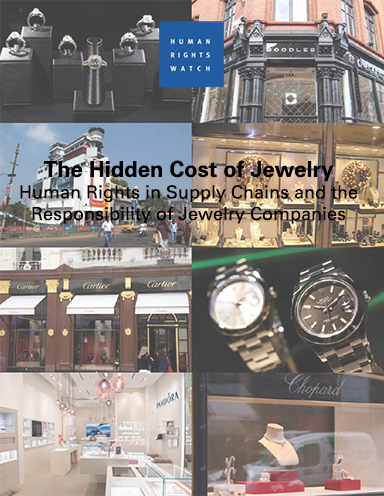Human Rights in Supply Chains and the Responsibility of Jewelry Companies
In this report, Human Rights Watch scrutinizes steps taken by key actors within the jewelry industry to ensure that rights are respected in their gold and diamond supply chains, the report focuses on the policies and practices of 13 major jewelry brands.
The Hidden Cost of Jewelry: Human Rights in Supply Chains and the Responsibility of Jewelry Companies
Jewelry and watches denote wealth and status, as well as artistry, beauty, and love.
Gold and diamond jewelry, in particular, are frequently purchased as gifts for loved ones and for special occasions.
Globally, about 90 million carats of rough diamonds and 1,600 tons of gold are mined for jewelry every year, generating over US$300 billion in revenue.
The purchase of bridal jewelry, including engagement and wedding rings, has particular emotional and financial significance.
In India, for example, weddings generate approximately 50 percent of the country’s annual gold demand.
For Valentine’s and Mother’s Day, Americans spend more on jewelry than any other type of gift, purchasing nearly $10 billion of jewelry for the two holidays in 2017.
For millions of workers, gold and diamond mining is an important source of income.
But the conditions under which gold and diamonds are mined can be brutal. Children have been injured and killed when working in small-scale gold or diamond mining pits. Indigenous peoples and other local residents near mines have been forcibly displaced.
In war, civilians have suffered enormously as abusive armed groups have enriched themselves by exploiting gold and diamonds. Mines have polluted waterways and soil with toxic chemicals, harming the health and livelihoods of whole communities.
Jewelers and watchmakers typically rely on complex supply chains to produce each piece of jewelry or watch. Gold, diamonds, and other minerals and gemstones are mined in dozens of countries around the world and are then typically traded, exported, and processed in other countries.
Processed gold and polished diamonds are then transformed into jewelry in manufacturing plants and artisan workshops, before reaching retailers. By the time a piece of jewelry is offered for sale, it may be very difficult to know the origins of the gold or diamonds it contains, or whether they are tainted by human rights abuses or environmental harms.
Despite this complexity, jewelry companies have a responsibility to ensure that their businesses do not contribute to human rights abuses at any point in their supply chains. Under the United Nations Guiding Principles on Business and Human Rights, an international standard on human rights responsibilities of companies, businesses have to put in place “human rights due diligence”- a process to identify, prevent, mitigate, and account for their own impact on human rights throughout their supply chain.
In this report, Human Rights Watch scrutinizes steps taken by key actors within the jewelry industry to ensure that rights are respected in their gold and diamond supply chains.
The report focuses on the policies and practices of 13 major jewelry brands, selected to include some of the industry’s largest and best-known jewelry and watch companies and to reflect different geographic markets: Boodles (United Kingdom), Bulgari (Italy), Cartier (France), Chopard (Switzerland), Christ (Germany), Harry Winston (United States), Kalyan (India), Pandora (Denmark), Rolex (Switzerland), Signet (United States-based parent company of Kay Jewelers and Zales in the US, Ernest Jones and H. Samuel in the UK, and other jewelers), Tanishq (India), Tribhovandas Bhimji Zaveri Ltd. (TBZ Ltd.)(India), and Tiffany and Co. (US). Collectively, these 13 companies are estimated to generate over $30 billion in annual revenue.
What’s Related



Favorites





